
by Editor | Apr 28, 2024 | News
Ladies and gentlemen, distinguished guests,
It is with great pleasure and honor that I stand before you today to celebrate the remarkable contributions of Dr. Alondra Nelson as she receives the prestigious 2024 World Leader in AI World Society Award.
Dr. Nelson’s illustrious career is a testament to her unwavering commitment to advancing public policy, governance of artificial intelligence, and our understanding of the societal dimensions of AI development and deployment. As the former Deputy Assistant to President Joe Biden and Acting Director of the White House Office of Science and Technology Policy, Dr. Nelson has played a pivotal role in shaping the landscape of AI governance and policy.
Her leadership at the OSTP led to the development of the groundbreaking “Blueprint for an AI Bill of Rights,” a significant milestone that has been integrated into federal policy under President Biden’s executive order. Dr. Nelson’s efforts have also been instrumental in expanding taxpayer access to federally funded research, advancing evidence-based policymaking, and championing equity and excellence in STEM fields.
Dr. Nelson’s achievements are well recognized and speak volumes about her impact on the global stage. Identified by Nature as one of the top 10 influencers in science and named to the TIME100 list of the most influential people in AI, her dedication and expertise have garnered international acclaim. Additionally, her nomination by the Biden-Harris administration and appointment to the UN High-Level Advisory Board on AI by Secretary-General António Guterres, highlights her pivotal role in shaping global AI governance.
Today, we gather to honor Dr. Nelson’s extraordinary contributions to society and to express our profound gratitude for her tireless efforts in advancing civil and human rights, democratic freedoms, and responsible AI practice. Her unwavering dedication exemplifies the core principles of the AI World Society initiative, and her vision continues to inspire us all as we navigate the complexities of the AI age.
In addition, I am pleased to note the Boston Global Forum’s pioneering efforts in AI governance since 2017 through the AI World Society Initiative. From its inception, BGF has been at the forefront of advocating for responsible and ethical AI development, striving to ensure that the benefits of AI are equitably distributed for all and that its potential risks are mitigated.
As Chair of Boston Global Forum, I am particularly gratified to witness the realization of BGF’s recommendations in AI governance. The impact of our collective efforts underscores the importance of collaboration and shared vision as we work through the challenges of the AI Age.
BGF’s commitment to advancing AI governance continues to strive for positive change and shape the future of technology policy on a global scale.
Dr. Nelson, on behalf of the Boston Global Forum and all those gathered here today, I extend my heartfelt congratulations to you. Your achievements are a beacon of hope for a future where technology serves the betterment of humanity. We are privileged to recognize your outstanding contributions and look forward to the continued impact of your work.
Thank you.


by Editor | Apr 28, 2024 | News
The Shinzo Abe Youth Leader Award recognizes outstanding individuals who have demonstrated exceptional leadership, innovation, and contributions to Japanese society, particularly in the context of the Age of AI and Digital advancement. This prestigious award honors those who have made a significant impact in Japan, exhibiting remarkable achievements and forward-thinking initiatives that have propelled their communities and the nation towards a brighter future.
Criteria for the Shinzo Abe Youth Leader Award include leadership that has had a profound and positive influence on Japanese society, innovative accomplishments in the realms of AI and Digital technologies, and notable contributions towards creating a better society for all. Recipients of this esteemed award are distinguished leaders who have not only excelled in their respective fields but have also dedicated themselves to driving meaningful change and progress in their communities and beyond.
As part of the recognition, recipients of the Shinzo Abe Youth Leader Award are invited to deliver a distinguished speech highlighting their achievements and contributions. Through these speeches, awardees share their insights, experiences, and visions for leveraging AI and Digital technologies to address societal challenges and foster positive transformation, ultimately aiming to inspire others to join them in their pursuit of building a better world.

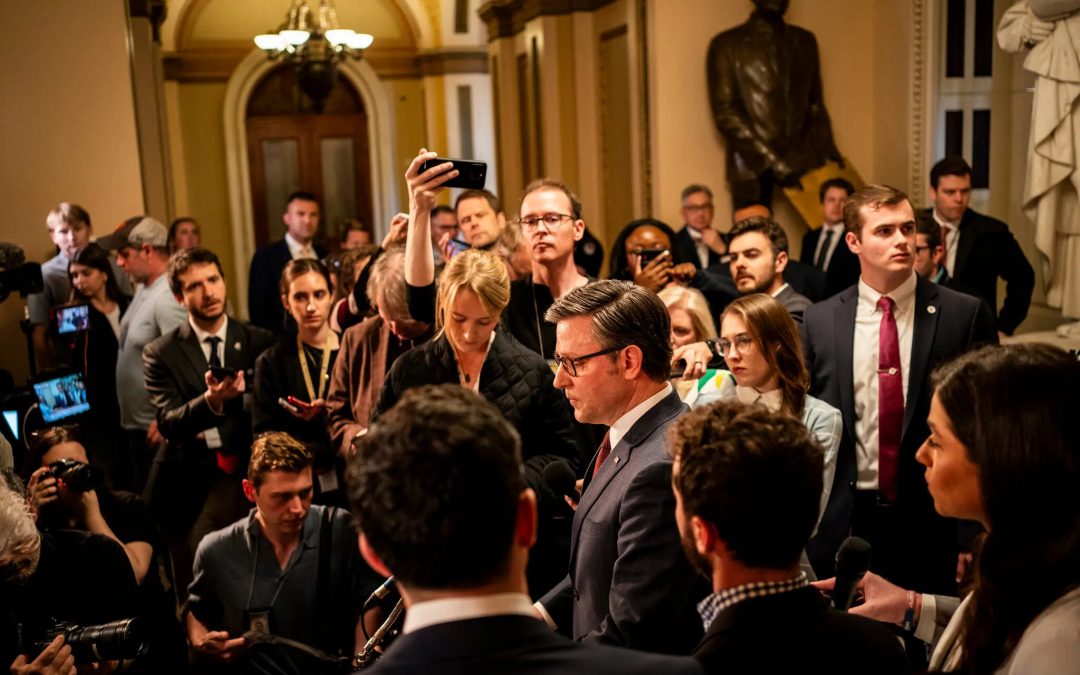
by Editor | Apr 22, 2024 | News
After months of domestic political stalling and deadlock, the US lower chamber (House of Representatives) has finally passed a military aid package for Ukraine. This is finally happening in part due to the current Speaker MIke Johnson’s final willingness to defy the isolationists in his party, even at the risk of losing his job. The foreign defense aid spending package also contains aid for Taiwan and Israel, which are vital theaters for the Four Pillars’ interests too. Furthermore, this package also contains a “sell or be banned” measure for TikTok, whose main bill which unfortunately stalled out in the US Senate.
Now, American and Four Pillars aid to Ukraine are especially important as there has been evidence that China is backing Russia with production and intelligence in their war too, a confirmation of the “natural friendship” the two regimes continue to share even if China tries to present itself differently.
In the Middle East, Israel has conducted its retaliatory actions against Iran, hitting both proxies and Iran itself through airstrikes and missile attacks. Interestingly, Iran state-affiliated media have downplayed the strikes, possibly as a way to sidestep the issue, as they may not have the capability for a full-blown state-to-state war. Still, for now, the moment appears to be de-escalated, or at least more so than where the situation was two weeks ago in the region.
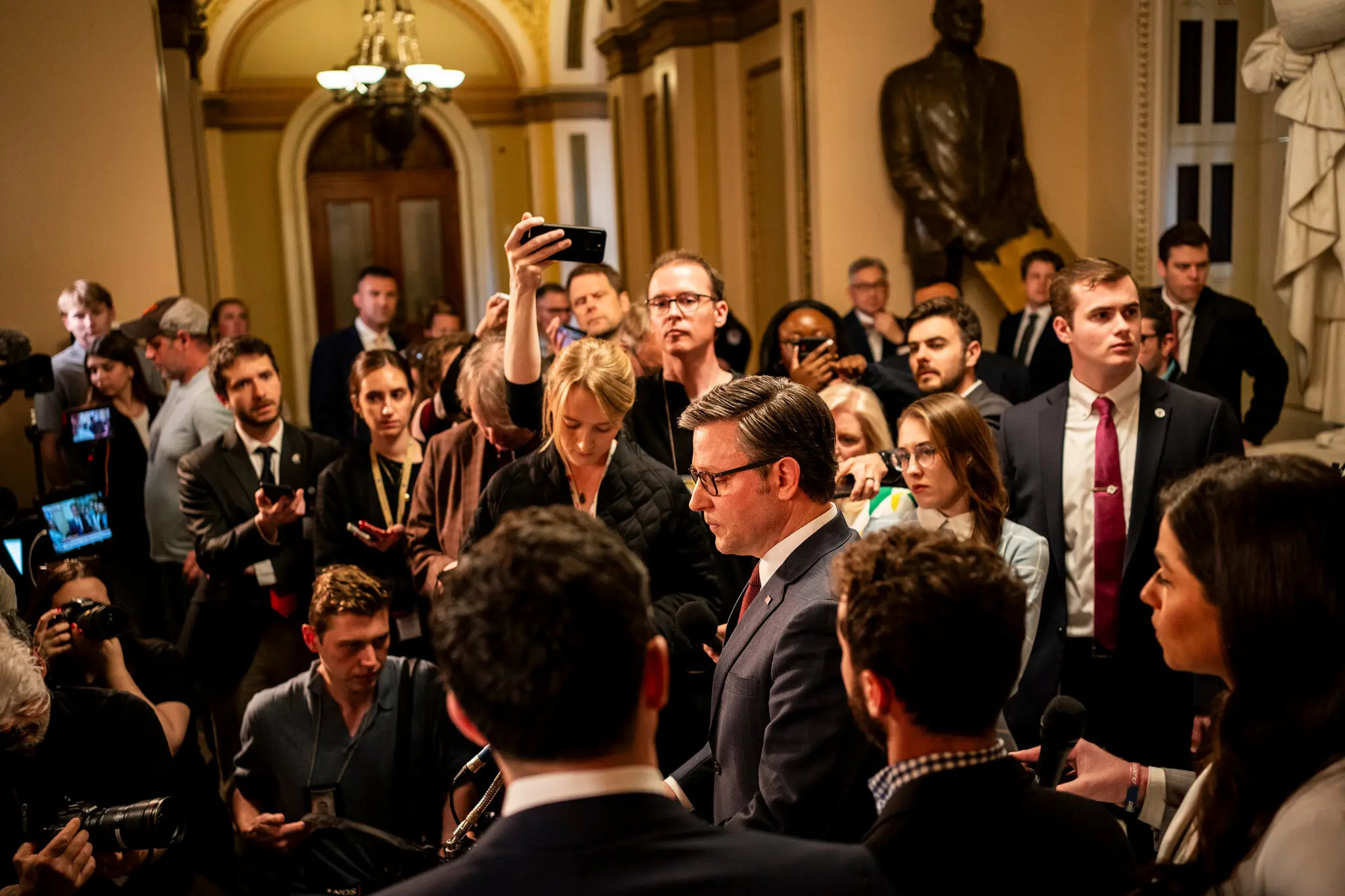
Haiyun Jiang for The New York Times
Minh Nguyen is the Chief Editor of the Boston Global Forum and a Shinzo Abe Initiative Fellow. She writes the Four Pillars column in the BGF Weekly newsletter.
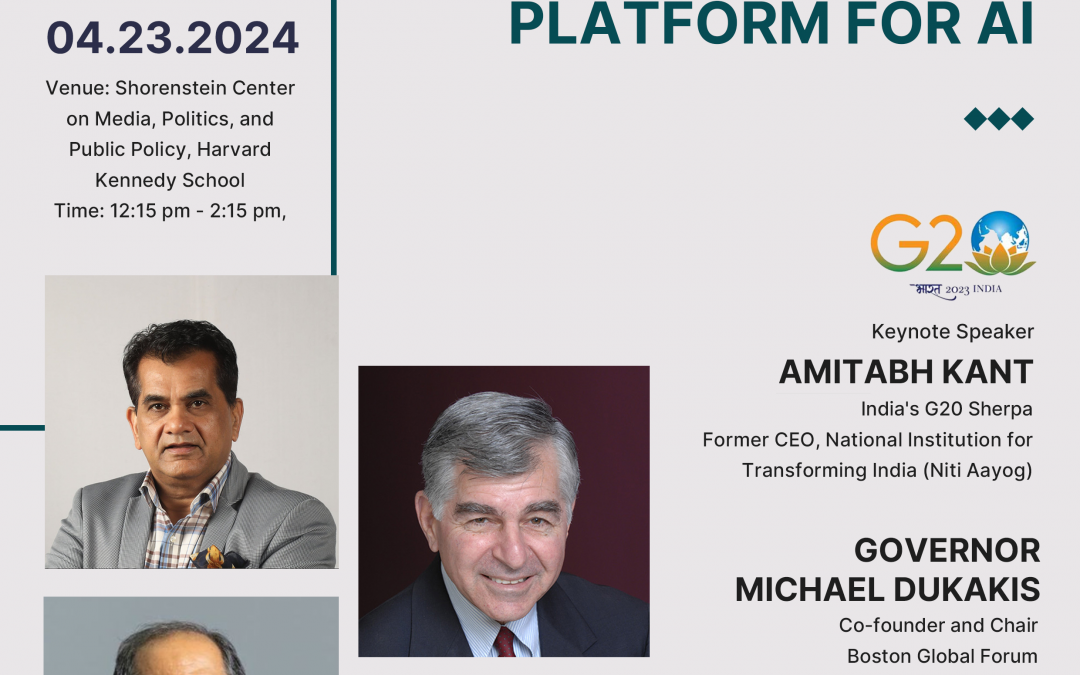
by Editor | Apr 22, 2024 | News
Mr. Amitabh Kant, India’s G20 Sherpa and Former CEO of NITI Aayog, India, will speak and discuss at the Boston Global Forum Roundtable “India’s G20 Sherpa: Citizen Stack and the Data Sovereignty – Knowledge Platform for AI Systems.” This event is scheduled from 12:15 PM to 2:00 PM on April 23, 2024, at the Harvard University Faculty Club.
India’s success in organizing the G20 Summit under the guidance of Sherpa Amitabh Kant has paved the way for further initiatives, notably the promotion of its Citizen Stack initiative. Building upon this momentum, the Boston Global Forum has conceived “The Data Sovereignty – Knowledge Platform for AI.” In this upcoming roundtable, Mr. Kant and BGF leaders will explore opportunities to bridge the Citizen Stack and The Data Sovereignty – Knowledge Platform for AI, fostering collaboration and synergy between the pioneering endeavors.
His expertise and insights are highly regarded, his perspective on India’s role as the G20 Sherpa, and its innovative approaches to AI systems, will greatly enrich discussions. His participation will be invaluable in advancing dialogue on global governance, technology, and policy.
The roundtable will be moderated by Harvard Professor Thomas Patterson, Co-founder of the BGF, and will include the participation of Governor Michael Dukakis, along with distinguished Harvard and MIT professors and scholars. The Editor of BGF Minh Nguyen will interview Mr. Amitabh Kant afterwards.
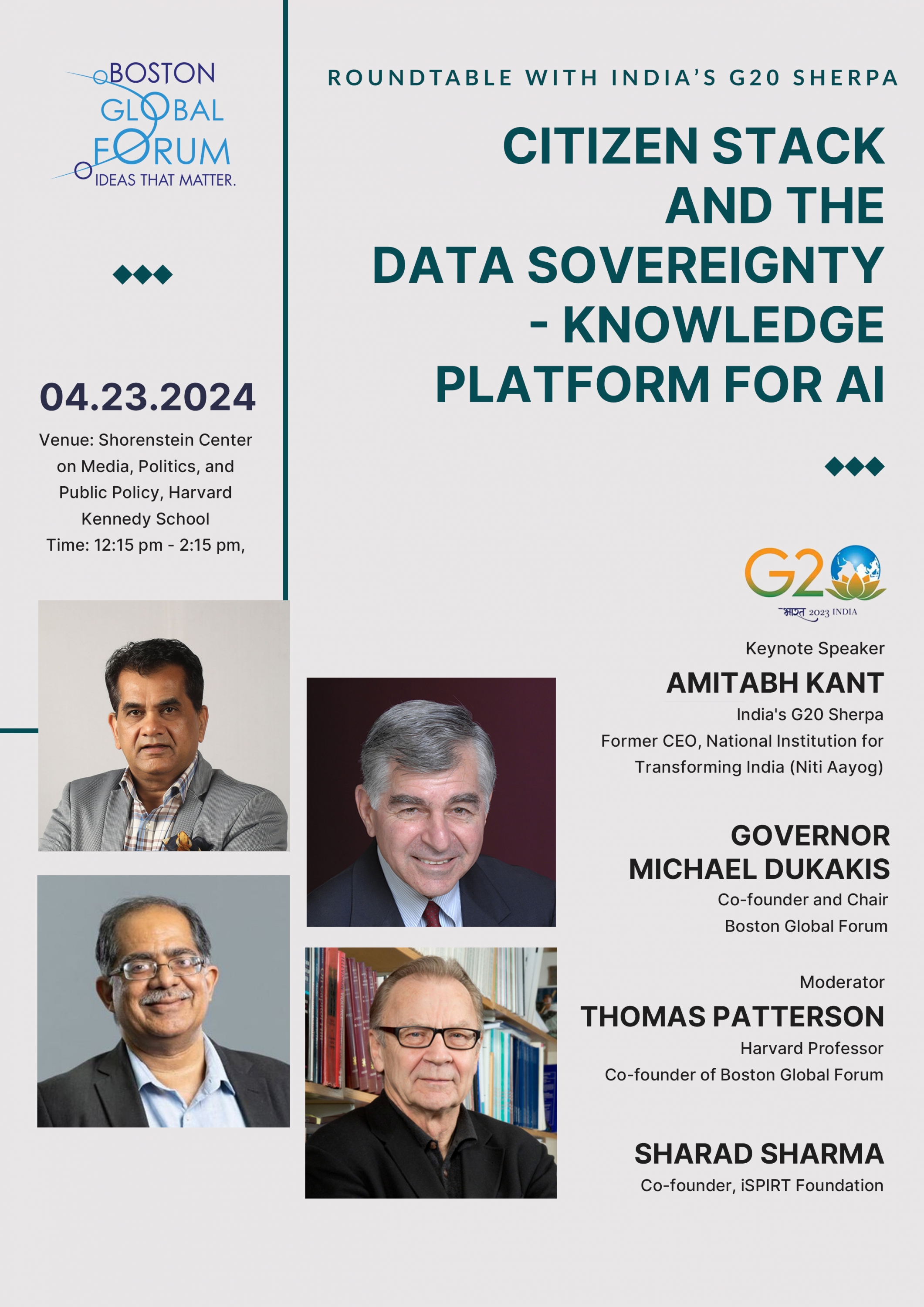

by Editor | Apr 22, 2024 | Global Alliance for Digital Governance
This is an excerpt from the full article published in the National Law Review. Please read it here.
We can expect content owners to continue seeking revenues generated by AIs in their content trains. Many will go the licensing route, though agreeing on how, for how long, and for how much will not be easy. Some will proceed with lawsuits, though few as high-profile as the Times’s. Others will focus on using their content to develop their own AIs. At some point, Congress may weigh in, first with hearings, then legislation, but anyone expecting a quick legislative fix will be disappointed. The legal issues arising from the success of OpenAI and its competitors show no sign of resolving soon. Lawyers will have plenty of work to do – perhaps using those same AI tools themselves.

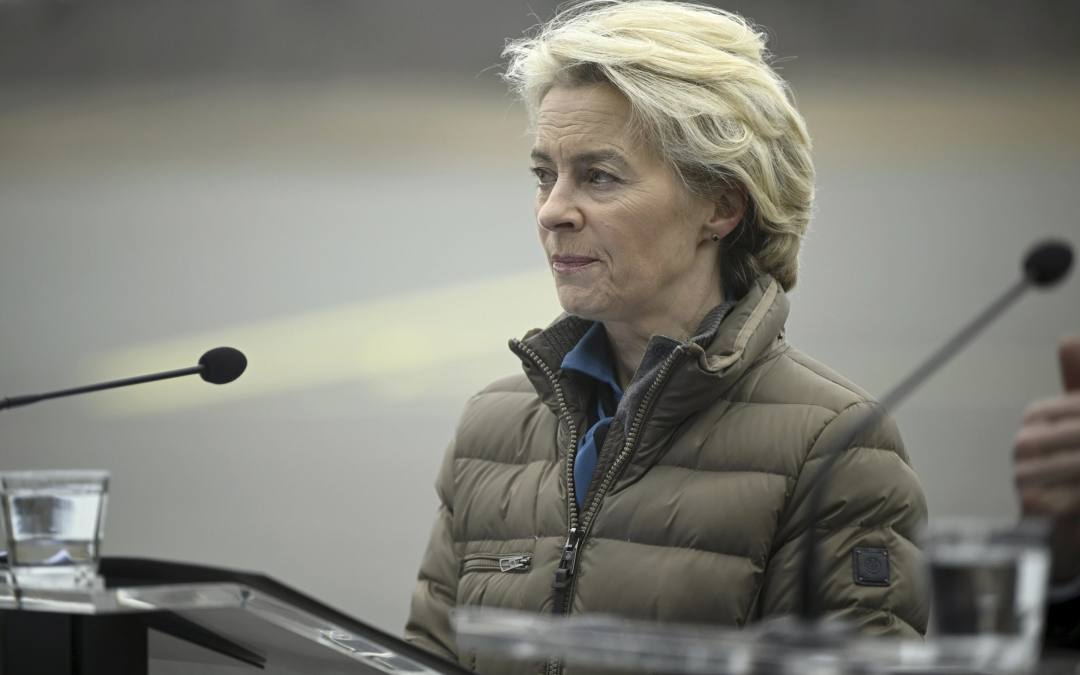
by Editor | Apr 22, 2024 | News
This is an excerpt from the full article published in the AP. Please read it here.
The head of the European Union’s executive branch said Friday that Finland’s decision to close its border crossings with Russia over a surge in migrants is a security matter for the whole 27-member bloc to consider.
European Commission President Ursula von der Leyen made the remarks during a trip to the frontier, visiting a part of the border located in southeastern Finland.
“We all know how (Russian President Vladimir) Putin and his allies instrumentalize migrants to test our defenses and to try to destabilize us,” von der Leyen told officials. “Now Putin is focusing on Finland, and this is no doubt in response to your firm support of Ukraine and your accession to NATO.”
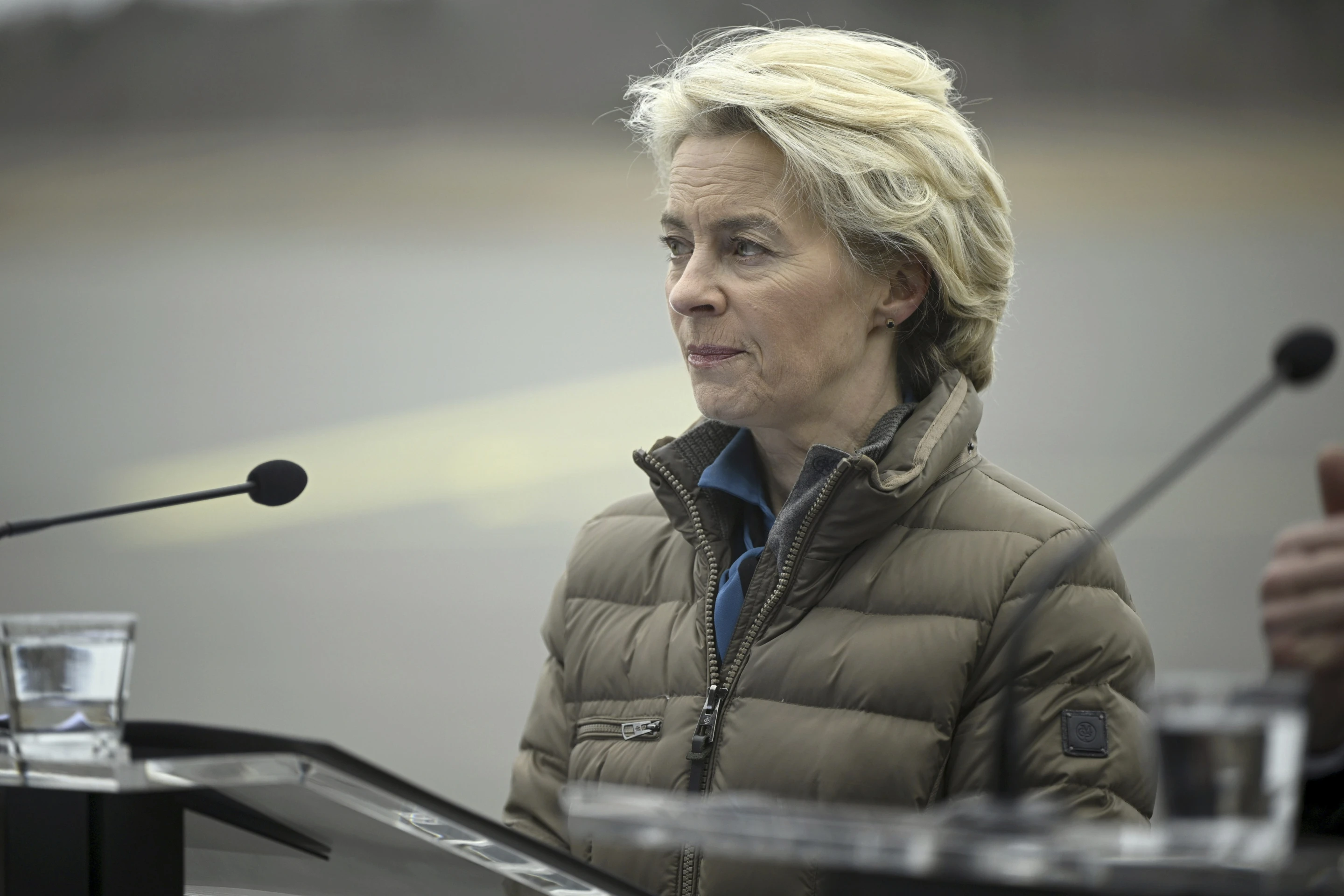
Antti Aimo-Koivisto/Lehtikuva via AP
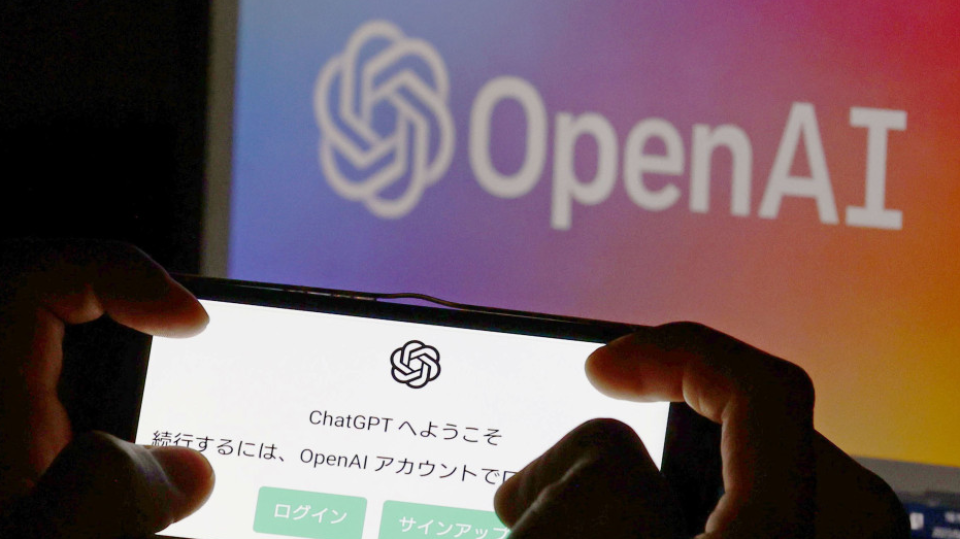
by Editor | Apr 22, 2024 | News
This is an excerpt from the full article published on the Kyodo News website. Please read it here.
Japan is considering establishing a new framework for dialogue involving like-minded nations to discuss international regulations on the appropriate use of generative artificial intelligence technology, a government source said Saturday.
Japanese Prime Minister Fumio Kishida is expected to reveal the plan to launch a “Friends” meeting on AI issues at a ministerial council meeting of the Organization for Economic Cooperation and Development scheduled for May 2 to 3 in Paris, the source said.
Through the framework, Japan will call for wider support for the “Hiroshima AI Process,” an initiative launched last year by the Group of Seven nations to facilitate discussions on the creation of global rules, according to the source.
The move comes as the world has been looking into how to harness rapidly developing generative AI tools, including ChatGPT, while fears grow that the spread of disinformation through the misuse of AI could threaten democracy and political stability.
The source said Japan aims to play a leading role in international AI rulemaking that would push for both the development of the technology and its regulation.
The creation of the Hiroshima AI Process was agreed at the G7 summit chaired by Kishida in Hiroshima in May.


by Editor | Apr 15, 2024 | News
Last week in Four Pillars, we discussed the Israeli strike on the Iranian embassy complex in Damascus and the retaliatory action that Iran promised. And now, that promise has been enacted upon. On April 13, Iran launched waves of drones and missiles headed for Israel. With the amount of drones numbering in the hundreds, Iran and its proxies was trying to overwhelm the Iron Dome and hit targets within Israel such as the Dimona reactor, This strike can be considered unsuccessful though, as Israel, the US, UK, and Jordan were able to shoot down most of the drones and missiles before they got to Israel, with many having been shot down over Iraqi or Jordanian airspace. These forces were able to intercept the attack, as they knew it was happening hours in advance due to the drones launches, with the only injury in Israel unfortunately being a Bedouin girl.
While the immediate threat of danger from the Iranian strike has passed, many variables are still at play in multiple dimensions. If this is the end of Iran’s action, they essentially have “played it safe” in terms of an attack, after all the rhetoric the IRGC and Hezbollah has been publicizing last week. Announcing “the matter can be deemed concluded” while the attack was still ongoing and the constant telegraphing of an attack (eg. shutting down airspace) gave hints that Iran was using the retaliation as posturing, that they do want to politically pick a fight with Israel, but lack the capacity a regional war would demand. On the other hand, launching drones and missiles from within Iranian territory does send a message that Iran itself was ready to ‘play ball’ with Israel, rather than through just proxies.
Essentially though, the ball is now in Israel’s court. It seems that the government is split between not escalating the situation, or to use the strike as a sort of casus belli to strike at their rival directly. The BGF and the Shinzo Abe Initiative urges Israel restraint during this time. While this is an opportune time to retaliate against Iran, it is also an opportunity to consolidate the goodwill into capital regarding the situation in Gaza. Many of the Pillars, especially those belonging to the G7, have condemned the attack and urged restraint in the region. President Biden has also noted that the US won’t support a retaliatory strike.
In addition, it is possible that Iran will continue attacking Israel, not from its territory, but rather through Hezbollah. An interesting note about the attack was that while proxies from Iraq and Yemen did join in the attack, the bulk of the missiles and drones came from within Iran itself. Still, Iran is at its strongest when acting through its proxies, and instead of launching drones that take hours to reach Israeli airspace, they can leverage Hezbollah as a disruptive force – and this is still a path to regional war.
In the end, it seems like none of the world wants a war between Israel and Iran, but the two direct stakeholders in the conflict themselves.
The Japan-US-Philippines Trilateral Summit was overshadowed by the event of the week, but it still brought about some productive results for the Pillars in the Indo-Pacific. One should take heed of PM Fumio Kishida’s words, that the US is not alone in upholding world order. This articulates exactly why the Pillars and their associated groupings (NATO, Quad, AUKUS, etc.) are so important – to resource-pool, cooperate, protect, and strengthen global norms and orders.

Israel Defense Forces handout via Reuters
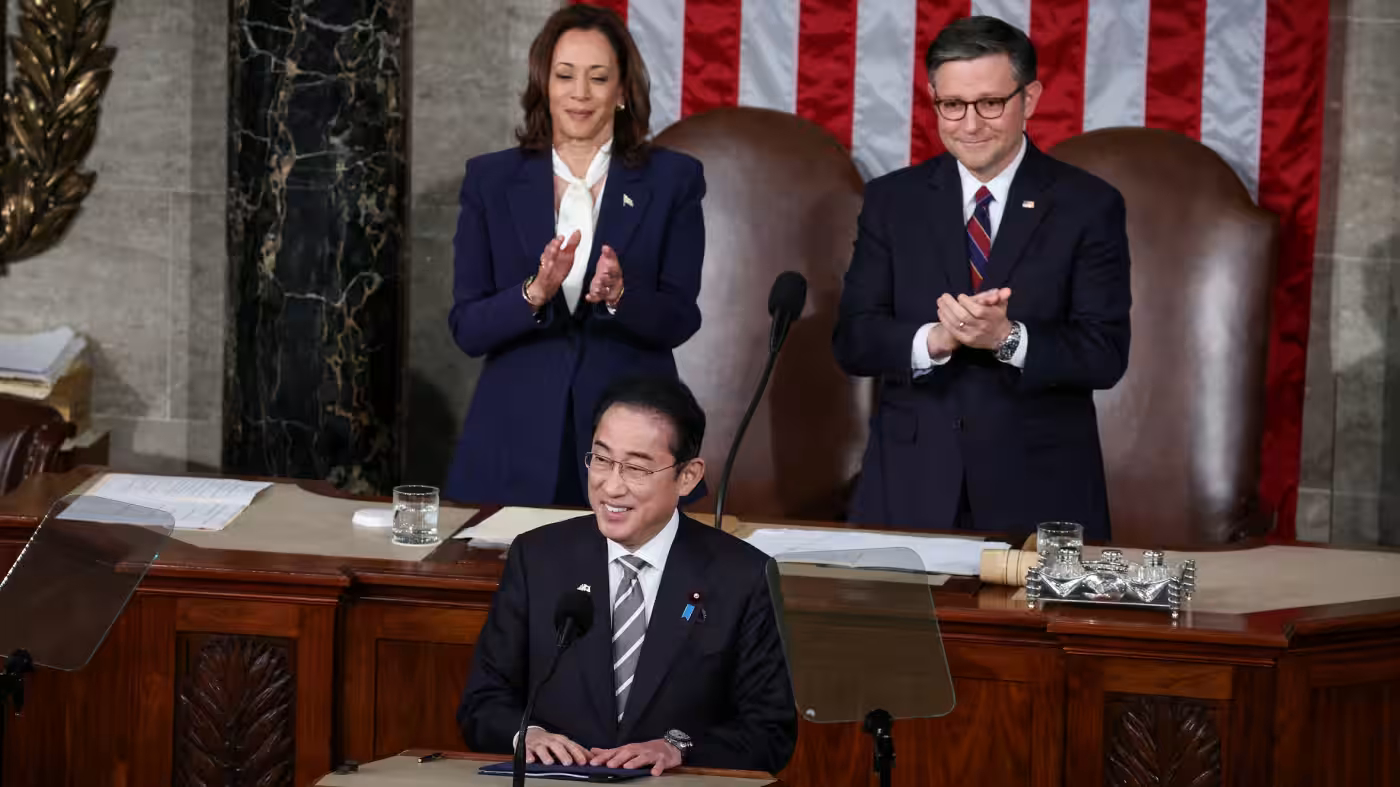
© Reuters / Japanese Prime Minister Fumio Kishida addresses a joint meeting of the U.S. Congress in Washington on April 11.
Minh Nguyen is the Chief Editor of the Boston Global Forum and a Shinzo Abe Initiative Fellow. She writes the Four Pillars column in the BGF Weekly newsletter.
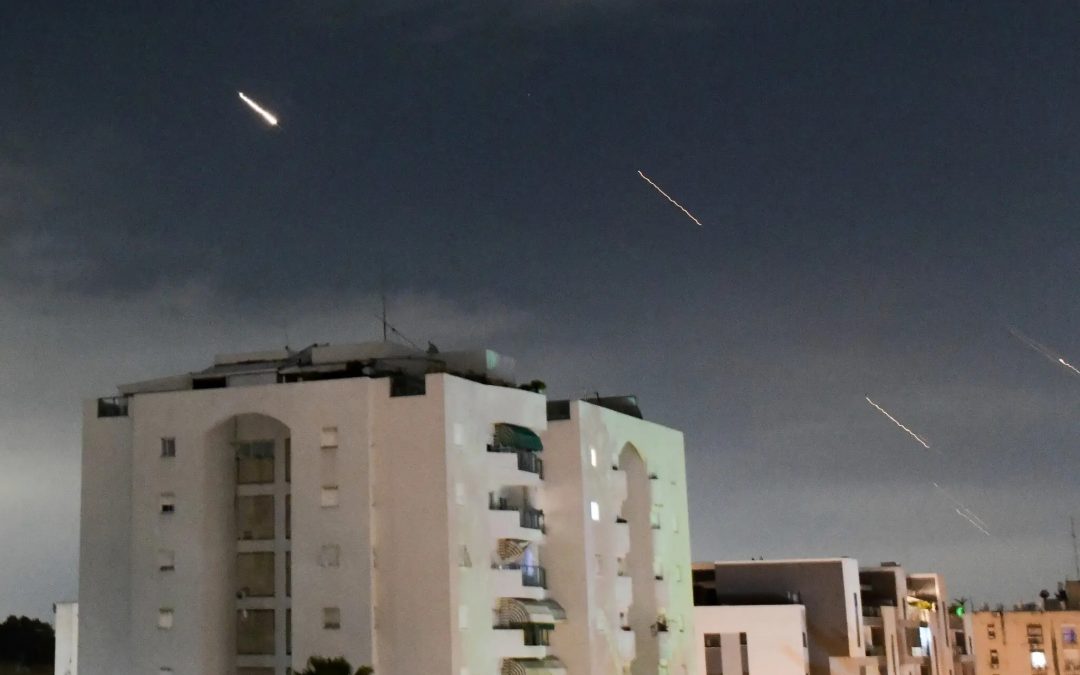
by Editor | Apr 15, 2024 | News
The Shinzo Abe Initiative condemns the Iranian attack on Israel over the weekend, which has the potential to provoke the crisis in the Middle East even further into a regional war. However, we also urge caution regarding an Israeli response, that their government should not take up a strong or escalatory military action against Iran at this moment. Restraint should be exercised in situations where offramps are exceedingly rare. We agree with the US’s assessment that it does not support a retaliatory strike on Iran, and we agree with G7 member-states in advising restraint in dealing with the situation.
Although this was a bombastic attack by Iran, which included waves of missiles and drone launches from within Iranian territory rather than just its proxies in the region, defense cooperation between not just Israel, the US, and the UK, but also local partners such as Jordan and (reportedly) Saudi Arabia, helped neutralize the attack. Still, it was clear that Iran had been telegraphing a strike for hours and even days, using very slow moving drones and clearing out airspaces, which helped prepare against the attack.
One of the positive points of this unfortunate event is that it demonstrates a capacity for coordination or mutual coexistence between Israel and Arab states, in the face of a common enemy. This can be a track towards normalization of relations in the region, or a track towards peace in the current Israeli-Hamas conflict. There are lessons and issues on conflict diffusion and escalation to be drawn from this flashpoint.

Tomer Neuberg/Associated Press
















